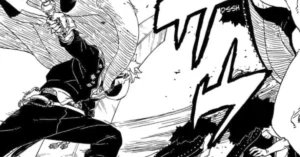“He knew who the killer was, yet did nothing to stop it, allowing Jack the Ripper to walk away from the scene.”
The second season of Hazbin Hotel has connected a beloved character’s backstory to one of history’s most infamous unsolved mysteries. A shocking revelation from Sir Pentious in Heaven confirms he was the sole witness to the beginning of Jack the Ripper’s killing spree in Victorian London. This new information provides a fictional but compelling answer to a real-world cold case and adds profound depth to a redeemed sinner’s guilt.
The Confession in Heaven
In Season 2, Episode 2, “Storyteller,” a redeemed Sir Pentious stands before the heavenly court to recount his life on Earth. He reveals that when he was a human in 1888, he was known as Pendleton, a socially anxious and reclusive inventor living in London. His story took a dark turn when he witnessed a horrific crime from his window.
Pendleton saw a vulnerable woman being brutally murdered in a nearby alleyway. Most significantly, he immediately recognized the killer as one of his own affluent clients, a man with considerable “influence in the community.” Paralyzed by fear, Pendleton did not alert the authorities. His silence allowed the killer to remain free, and the murderer went on to claim the lives of five more women. This specific detail aligns perfectly with the five canonical victims of the real Jack the Ripper. Pentious confesses that this profound moral failure—his cowardice in the face of evil—was the sin he carried to his grave, likely cementing his initial damnation to Hell.
The Historical Jack the Ripper
The show’s reference is a direct nod to the real-life “Autumn of Terror” that gripped London in 1888. The real Jack the Ripper was an unidentified serial killer who terrorized the Whitechapel district, and his victims were primarily women. The killer was never caught, and his identity has remained one of the world’s most enduring true-crime mysteries. The series cleverly weaves this historical horror into its own narrative, suggesting that the fear and inaction of one man allowed a monster to continue his work.
A Clue to the Killer’s Identity
By having Sir Pentious identify the killer as a client, Hazbin Hotel narrows down the field of potential suspects from history. The detail that the murderer was an influential figure points strongly toward real-life historical suspect Montague John Druitt. Druitt was a wealthy barrister, a profession that would have given him both social standing and influence. This aligns with Pentious’ description of the man.
Furthermore, Druitt’s timeline matches the end of the Ripper murders. The killings stopped abruptly after November 1888, and Druitt was found dead in the River Thames in December of the same year. Many theorists have long speculated that his death is what ended the murder spree. A successful barrister would also be exactly the type of person who could have been a client of an inventor like Pendleton, making the fictional connection historically plausible.
Jack the Ripper’s Fate in Hell
While the killer’s human identity remains visually hidden in Pentious’ memories, the show’s expanded universe confirms that Jack the Ripper is indeed a sinner in Hell. He is not just any sinner, but a notorious one. In the hellish universe, he is known as a sadistic and narcissistic serial killer who has continued his murderous spree in the afterlife, primarily targeting sex workers and succubus demons.
“I remember their screams as I plunged my knife into their chest… I’ve embraced what I have become, and I do not seek redemption,” the Ripper says to Charlie in one fan-based story.
His notoriety in Hell is amplified by a unique and forbidden ability: he is the first sinful demon known to have found a way to illegally travel between the Rings of Hell, despite sinners being confined to the Pride Ring. This has made him a wanted target, especially in the Ring of Lust, where its ruler, Asmodeus, has placed a bounty on his head. His ability to evade capture in Hell mirrors his elusive nature in life.
A Deeper Meaning for Redemption
This revelation recontextualizes Sir Pentious’ entire journey. His initial failure to act created a deep-seated guilt that defined his existence in Hell. His eventual redemption, achieved through his sacrificial act to protect his friends, becomes even more meaningful. It shows that even someone who carried the weight of such a grave indirect complicity could find a path to forgiveness, letting go of a guilt that had haunted him for over a century.
The connection also serves as sharp social commentary. By suggesting the killer was a powerful man who used his influence to evade justice, the show highlights themes of accountability and the failure of systems to protect the vulnerable. Pentious’ story is a mirror of a society that allowed a privileged murderer to operate with impunity.
A Lasting Impact
Hazbin Hotel has masterfully incorporated a piece of grim history into its character-driven story. The link between Sir Pentious and Jack the Ripper provides a fascinating fictional solution to a real historical puzzle while adding immense emotional depth to a redeemed character’s past. This creative decision enriches the show’s world, proving that the sins of Earth continue to echo powerfully in the afterlife.
Also Read: Kim Sejeong Reunites With Familiar Face From Business Proposal in New Historical K-Drama
Typhoon Family Faces Viewer Backlash Despite Topping Ratings Charts






























